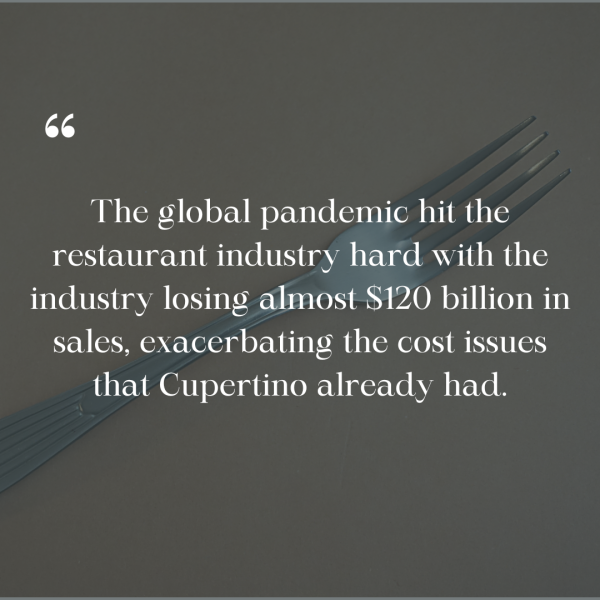According to a KTVU article, on Nov. 10, 2022, Cupertino restaurant Pho Ha Noi announced it would automatically be putting an 18% gratuity fee on orders for all orders. This announcement caused a wave of upset and social media backlash, with many claiming that they didn’t know where their money was going and that the tip rate was incredibly high. While many restaurants would add a gratuity fee for large parties, customers felt that it was unjustified to add a gratuity fee for smaller parties, especially since many would be unaware of the fact until they would have to pay. Pho Ha Noi co-owner Harry Nguyen responded to the complaints.
“We are trying to do that because service workers don’t have enough pay for the very expensive living in the Bay Area right now,” Nguyen said.
While Pho Ha Noi has been able to survive after that step, many businesses in Cupertino have had to close down due to being unable to pay their workers and keep up with property costs. According to PayScale, the cost of living in Cupertino is 142% higher than the national average, with housing specifically being 448% higher, utilities 9% higher and groceries 43% higher. These large disparities in cost highlight how expensive it is to run a food business in Cupertino compared to other areas, explaining why many restaurants in Cupertino either have to inflate their prices or close down entirely.
During her freshman and sophomore years, junior Hershey Janga would often go with her friends and family to Vons Chicken, a fast-food chicken restaurant that used to be on De Anza Boulevard. The closure of Vons Chicken in 2021 prompted Janga to consider why many new businesses were closing and what these closures had to say about the economy of Cupertino.
“There’s definitely a diverse set of places when it comes to fast food and restaurants in general, but Vons Chicken was one of my favorites,” Janga said. “There were a lot of options there and really good sides. I was really surprised when it closed down and was pretty sad, quite frankly. I really thought it would last longer.”
Senior Aarushi Jain echoes this sentiment, mentioning that Pizza Pub, a fusion pizza place that recently closed down, was in a similar position as Vons Chicken. Jain previously lived in the Santa Clara area, so the price changes weren’t drastic for her. However, because Janga moved to Cupertino from India, she says she underwent a large cultural shift that not only exposed her to new types of cuisines but also a hefty increase in food costs. While both students felt that lack of diversity in cuisine was not a huge issue, they noticed how oftentimes, food prices would be unreasonably high.
“The food is very expensive,” Jain said. “Most of the food is still good, but it’s just really expensive, especially for us. I’m a high school student and most of the people in Cupertino who go to these restaurants are also students. The food should be more affordable.”
Kathleen Guo, the owner of Chinese restaurant XLB Kitchen, has considered the quality and authenticity of her food throughout her time running the business, creating a unique atmosphere in her restaurant. Unlike other small businesses, Guo has found success operating this restaurant for over seven years after moving from Mountain View. Customer Michael Yau translated for Guo to share her ideas on how she has kept her business running.
“Cupertino is an area where there are more Chinese people and there are many tech companies around, so she feels this area is right for her,” Yau said. “Kathleen feels like the biggest challenge is that many Chinese restaurants had good furnishing and were very well decorated, so she decided to focus on the food itself.”
To make XLB Kitchen stand out from other restaurants, Guo says she makes sure the restaurant has a tight-knit atmosphere to build a loyal customer base. She also focuses on making her food as authentic as possible.
“Guo feels that the reason her restaurant has survived in this area is because of three different points,” Yau said. “First is the quality of food — you want to make sure her customer likes her [food]. Second, you want to make sure the customers feel at home so they will come back as well. And then number three would be the right price point.”
Jain recognizes this effort in Pizza Pub too, highlighting many of the authentic Indian flavors of pizza that they used to offer such as Paneer Tikka Masala, along with their affordable prices. She describes how their emphasis on maintaining low prices and keeping up the quality of food during a time of rapid growth in property, food and utility costs is what led to their closure.
Yau states that the loyal customer base that Guo has built up over the years was a major part of XLB Kitchen’s survival during COVID. The global pandemic hit the restaurant industry hard with the industry losing almost $120 billion in sales, exacerbating the cost issues that Cupertino already had. As everyone was forced to quarantine, the idea of sit-down restaurants was almost completely erased, leading to layoffs and losses. Even around 2022, as many people began to return to restaurants in Cupertino, sales would only account for 15-20% of what they were before the pandemic, further emphasizing the need for businesses like Pho Ha Noi to increase their prices, to keep up with worker salaries and thrive in the Bay Area economy.

Guo says that her customers, along with her outdoor patio and take-out system, allowed her to remain successful during the pandemic. However, Guo feels that going forward, one of the main challenges her restaurant will face is the rise of large businesses using pre-made food, allowing them to produce food more efficiently. Guo explains that this could impact food sustainability in Cupertino as a whole, as small businesses may be forced out due to their inability to remain cost-competitive.
“[Guo] began to see her competition use pre-made food that came from factories,” Yau said. “The result of that is the pre-made food is able to sell cheaper than Kathleen since she’s very persistent on using fresh food made by traditional chefs. At the same time, she feels that her unique value will be very difficult to keep, as the traditional chefs, especially young ones, are no longer [available].”
Janga has also noticed this problem, noticing large chain restaurants stay in business for a long time while local businesses or smaller chain restaurants constantly get closed down and replaced by new restaurants.
“It just feels like no business is viable to run in Cupertino because of everything,” Janga said. “The cost of living is crazy high, and as far as I’ve seen, it’s only been going up. It’s crazy to see how these places like Vons Chicken were literally running for less than a year. There needs to be something changed about Silicon Valley or the same thing is just going to happen to more and more businesses.”












